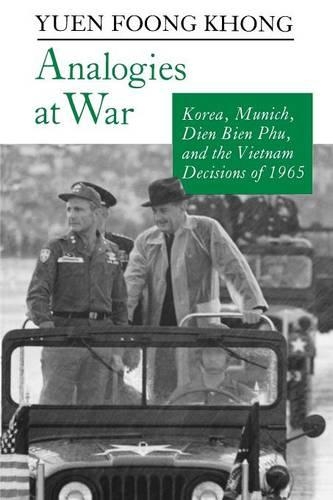
Analogies at War: Korea, Munich, Dien Bien Phu, and the Vietnam Decisions of 1965
(Paperback)
Publishing Details
Analogies at War: Korea, Munich, Dien Bien Phu, and the Vietnam Decisions of 1965
By (Author) Yuen Foong Khong
Princeton University Press
Princeton University Press
13th July 1992
United States
Classifications
Professional and Scholarly
Non Fiction
Asian history
Central / national / federal government policies
Military and defence strategy
General and world history
959.7043373
Runner-up for Choice Magazine Outstanding Reference/Academic Book Award 1993
Physical Properties
Paperback
304
Width 152mm, Height 235mm
454g
Description
From World War 1 to Operation Desert Storm, American policymakers have repeatedly invoked the "lessons of history" as they contemplated taking their nation to war. Do these historical analogies actually shape policy, or are they primarily tools of political justification Yuen Foong Khong argues that leaders use analogies not merely to justify policies but also to perform specific cognitive and information-processing tasks essential to political decision-making. Khong identifies what these tasks are and shows how they can be used to explain the U.S. decision to intervene in Vietnam. Relying on interviews with senior officials and on recently declassified documents, the author demonstrates with a precision not attained by previous studies that the three most important analogies of the Vietnam era - Korea, Munich and Dien Bien Phu - can account for America's Vietnam choices. A special contribution is the author's use of cognitive social psychology to support his argument about how humans analogize and to explain why policymakers often use analogies poorly.
Reviews
One of Choice's Outstanding Academic Titles for 1993 "Khong's interviews and newly declassified documents make a compelling case the American decision-makers in 1965 used historical analogies not only to justify decisions but to make them, most notably in the process of rejecting options."--Foreign Affairs
